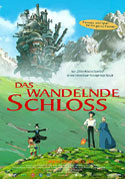

Opening 25 Aug 2005
Directed by:
Hayao Miyazaki
Writing credits:
Hayao Miyazaki, Diana Wynne Jones
This marvelous Japanese fairy tale opens with Sophie falling helplessly in love with Hauro, a beautiful youth with gorgeous green earrings. A jealous witch puts a curse on her which ages Sophie to an old woman. Bent and arthritic, she wanders through the countryside, repeating the equivalent of Bette Davis "Old age ain’t for sissies,” finally to reach Hauro’s magic castle. It’s a mess and she becomes the housekeeper, cleaning and caring for the inhabitants: Calcifer the fire demon and Markl, a small boy. Hauro flies in and out occasionally, but takes little notice of Sophie, she looking like Maude to his Harold. Sophie tries to win Hauro’s non-existent heart. A vain boy, he sobs, “There’s no sense to life if you aren’t beautiful.” The castle has its own personality, much like an insect born after an atomic attack. Genetically impossible and huge, it lumbers along on thin chicken legs which balance the turrets, balconies, bay windows and chimneys sticking in all directions. The front door opens magically into different places, e.g., a town, a city or an open field.
Lucky for us, early in his career director Hayao Miyazaki resisted offers from Walt Disney and kept to his own concept, giving us something unique. Based on the book of the same name by Diana Wynne Jones, the fantastic goes down many paths and is a challenge to your imagination. Why is the scarecrow faithful? Where did the dog come from? Why are the nations bombing each other? Why does Hauro change his shape? Why is Sophie’s mother so superficial? Why does Sophie sometimes look younger and why does she adopt the old witch into the patchwork family? There is not a boring moment in this animated film for adults and children. Alone, the detailed, delicate hand-drawn pictures of people and places, not necessarily Japanese or even Asian, as well as the tasteful music, make it worth every minute. My colleague Thelma Freedman said, “I’ve never seen anything like this before,” and you haven’t either unless you are a fan and also saw Spirited Away, the 2001 prize-winning film by the same crew. (Becky Tan)